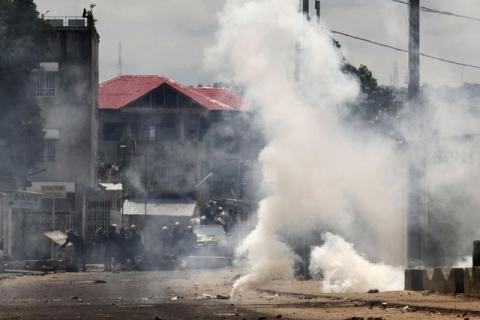Advertisement
Police fire tear gas on crowd of mourners in eastern Congo
KINSHASA (Reuters) - Congolese police fired tear gas to disperse hundreds of people who had gathered in the eastern city of Goma on Saturday to pay tribute to victims of recurrent attacks nearby, organisers said.
The intervention is the latest in a series of crackdowns by Congolese authorities against activist groups ahead of a tense electoral period. At least two people were wounded and 14 arrested on Saturday, the sources said.
Some 500 people had gathered by 8:30 a.m. (0630 GMT) to hold photos and light candles in memory of civilians killed around the northeastern town of Beni, Luc Nkulula, one of the organizers from the youth activist group, Struggle for Change (Lucha), told Reuters.
Two dozen police officers arrived in the Majengo neighbourhood shortly afterwards, firing tear gas and live bullets as the crowd fled, he added.
"There were two wounded - a 15-year-old girl and an 18-year-old boy," Nkulula said. "In addition, 14 people were arrested...including two members of Lucha."
A police spokesman said he did not have any information on the incident.
The massacres near Beni, most committed in overnight raids with machetes and hatchets, have killed more than 500 people since October 2014, according to local activists. The government has blamed Ugandan Islamist rebels, although some analysts argue that other armed groups or criminal gangs are likely involved.
Nkulula added that Lucha had received authorization to hold the event from the mayor of Goma, although this could not immediately be confirmed with local authorities.
The incident comes amid high political tensions in Congo ahead of a presidential election scheduled for November 2016. President Joseph Kabila, in power since 2001, is required by the constitution to step aside but critics accuse him of trying to hold onto power.
Kabila has refused to comment publicly on his political future, though a spokesman has said that he intends to respect the constitution.
In a report this week, Amnesty International accused authorities of arbitrary arrests and detentions against political opponents who have spoken out against a prolongation of Kabila's mandate.
The government has denied that arrests of activists and political opponents are politically motivated.
(Reporting By Aaron Ross; Editing by Emma Farge and Dominic Evans)



















Add new comment